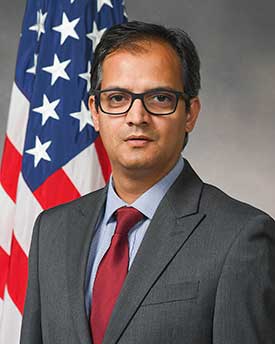This 10-week educational internship program posthumously honors Dr. Daniel W. Repperger, who mentored many young people during his 35-year research career with the Air Force Research Laboratory (AFRL), by providing research opportunities for students to participate in research projects at one of the Air Force facilities under the mentorship of an AFRL scientist. Each scientist has been selected to mentor, because of their technical knowledge, experience, and willingness to help science and engineering students enhance their learning through participation in an actual Air Force research project.

Dr. Repperger
The Repperger Research Intern Program honors the life and work of Dr. Daniel W. Repperger (1942-2010), a scientist and mentor to many young engineers and scientists. As a researcher in the Air Force Research Laboratory’s Human Effectiveness Directorate for 35 years, Dr. Repperger’s mathematical and scientific innovations have revolutionized image and network complexity analysis. He received international recognition in haptic controllers, human-machine interface performance enhancement, and mathematical methods development. While Dr. Repperger’s significant research accomplishments helped advance the performance of Air Force airmen and the field of human-centered research, his most significant accomplishment may well be the impact he had as a kind and caring mentor of many young Air Force scientists and science and engineering students.
Dr. Repperger received a BS and MS in Electrical Engineering from Rensselaer Polytechnic Institute and a PhD in Electrical Engineering from Purdue University. He was a David Ross Research Fellow at Purdue from 1971-1973 and a National Research Council Post-Doctoral Fellow at Wright-Patterson AFB from 1973-1975. A member of Eta Kappa Nu, Tau Beta Pi and Sigma Xi, Dr. Repperger was a Registered Professional Engineer in Ohio and on the Board of Trustees of the Ohio Academy of Sciences. He was a Fellow of the IEEE, Air Force Research Laboratory, American Institute of Medical and Biological Engineering, the Ohio Academy of Science and the Aerospace Medical Association. Dr. Repperger authored over 400 technical journal articles, reports and conference publications, was selected as Associate Editor of five international journals and obtained 14 U.S. patents and 28 Air Force invention registrations. His honors and awards include the Harry G. Armstrong Scientific Excellence Award, Human Effectiveness Directorate Mentor of the Year, IEEE Third Millennium Medal Winner and the IEEE Dayton Fritz Russ Award. Dr. Repperger is listed in the Who's Who in Science and Engineering and the American Men and Women of Science.

Gaurav Sharma, PhD, ST
Chief Scientist
711th Human Performance Wing
As the Chief Scientist for the 711th Human Performance Wing at the Air Force Research Laboratory, I invite you to submit an application to participate in our 2024 Repperger Intern program. This program posthumously honors Dr. Daniel W. Repperger, who mentored many scientists and engineers during his 35-year research career with our organization, by providing opportunities for student interns to conduct research in one of our facilities. Interns will participate under the mentorship of an AFRL scientist or engineer who has been selected to mentor because of their technical knowledge, experience and willingness to help science and engineering students enhance their learning through participation in an actual Air Force research project.
Please review the information and application instructions to determine your eligibility and then review the research projects to see if any match your research interests. If selected for one of the projects, you will be appointed to a 10-week summer research internship at one of our two research locations: Wright-Patterson Air Force Base, Dayton, OH and Joint Base San Antonio-Fort Sam Houston, San Antonio, TX. The research appointments will be administered by the Oak Ridge Institute for Science and Education (ORISE).
Along with gaining first-hand research experience, you will learn the inner workings of an operational Department of Defense laboratory and develop contacts and a network that will help you in your professional career. Again, please review the information on this website carefully to understand the specifics of the program before you apply. I look forward to reviewing your application and wish you the best of luck in the selection process.
Gaurav Sharma, PhD, ST
Chief Scientist
711th Human Performance Wing
For more information about the 711th Human Performance Wing, visit the website.
|
Program Dates: |
June 2, 2025 – August 8, 2025 |
|
Stipend: |
Stipend (for 10-week appointment): Relocation Allowance: $500 |
|
Lodging: |
Participants are responsible for securing their own living space and determining the means of local transportation prior to arriving at the assigned appointment site. |
|
Research Locations: |
Wright-Patterson Air Force Base, Dayton, OH, with options for AFRL Collaborative Labs at Wright State University; or Joint Base San Antonio-Fort Sam Houston, San Antonio, TX |
|
Number of Participants: |
Between 20-25 students will be selected for participation. |
|
Eligibility Requirements: |
Applicants need to meet the following eligibility criteria at the time of application:
|
|
Final Report: |
All selectees are encouraged to prepare a PowerPoint presentation or poster by end of internship. Notifications will be made to those required to present their poster or slide deck during the intern summer close-out summit. |
|
Application Deadline: |
January 20, 2025, at 11:59 p.m. EST It is anticipated selected candidates will be notified by late February - early March 2025. |
|
Additional Documents Required Upon Selection: |
Proof of Spring 2025 academic enrollment |
|
Computer Access |
Students selected will be required to undergo a National Agency Check prior to being granted access to government computer systems. |
|
Notification: |
Students selected for the program will receive an appointment with the Oak Ridge Institute for Science and Education (ORISE) to participate in a research project sponsored by the 711th Human Performance Wing. The participant will not enter into an employee/employer relationship with ORISE, ORAU, DOD, or any other office or agency. Instead, the participant will be affiliated with ORISE for the administration of the appointment through the ORISE appointment letter and Terms of Appointment. |
2025 Project Catalog
AFRL-RHB-25-01 : Neurotechnology-Enabled Cognitive Performance Monitoring and Enhancement (.PDF, 168KB)
AFRL-RHB-25-02 : Blast Overpressure Indicators of Exposure (.PDF, 165KB)
AFRL-RHB-25-03 : Investigating the Impact of Cold Stress on Performance (.PDF, 170KB)
AFRL-RHB-25-04 : Machine Learning Models for Predicting Acute Lung Injury (.PDF, 157KB)
AFRL-RHB-25-05 : Wearable Performance for Lumbar Load Prediction (.PDF, 153KB)
AFRL-RHB-25-06 : Finite Element Modeling of Lumbar Spine during Parachute Operations (.PDF, 152KB)
AFRL-RHB-25-07 : Multi-joint Loading Distributions During Parachute Operations (.PDf, 169KB)
AFRL-RHB-25-08 : Assessing the Role of the Microbiome in Warfighter Performance (.PDF, 166KB)
AFRL-RHB-25-09 : Molecular Tools for Biosensing Laboratory (.PDF, 164KB)
AFRL-RHB-25-10 : Wearable Sensor Optimization for Human Movement Biomechanics (.PDF, 172KB)
AFRL-RHB-25-11 : Electrochemical Array Sensing Platform for Detection of Human Performance Biomarkers (.PDF, 170KB)
AFRL-RHB-25-12 : Evaluation of the Impact of the Oral Microbiome on Exhaled Breath Data (.PDF, 164KB)
AFRL-RHB-25-13 : Electronic/Electrochemical/Optical Sensor for Molecular Biomarkers (.PDF, 152KB)
AFRL-RHB-25-14 : Advancing Microphysiological Systems for Holistic Warfighter Assessment (.PDF, 167KB)
AFRL-RHD-25-01 : Development of a Phantom for Diffusion Magnetic Resonance Imaging (MRI) in Radio Frequency Bioeffects (.PDF, 166KB)
AFRL-RHD-25-02 : Advanced Imaging Tools to Identify Biological Mechanisms of Directed Energy Interaction (.PDF, 166KB)
AFRL-RHD-25-03 : Modeling Neural Action Potential Response to IR Stimulation (.PDF, 154KB)
AFRL-RHW-25-01 : Analysis of Human Perception of Sound in Different Data Collection Paradigms (.PDF, 165KB)
AFRL-RHW-25-02 : The Battle of the Minds: Cognitive Warfare, Social Influence, and the Age of AI (.PDF, 172KB)
AFRL-RHW-25-03 : Understanding and Modeling Human Cognition (.PDF, 165KB)
AFRL-RHW-25-04 : Human AI Co-Learning for Adaptive Teaming in Space Operations (.PDF, 160KB)
AFRL-RHW-25-05 : Cognitive and Human Factors Aspects of Space Object Observation (.PDF, 162KB)
AFRL-RHW-25-06 : Network Characterization and Monitoring via Mixed Modeling of Network Properties (.PDF, 170KB)
AFRL-RHW-25-07 : Closed-Loop Human-Automation Interaction Adaptation (.PDF, 155KB)
AFRL-RHW-25-08 : Predictive Knowledge Exploration Guided through Multimodal Sources (.PDF, 162KB)
Submit Application in Zintellect
Application submission deadline: January 20, 2025, at 11:59 p.m. EST.
A complete application consists of:
If you have questions, send an email to AFRL-Summer@orise.orau.gov. Please list the reference code of this opportunity [AFRL-711HPW-2025-Repperger] in the subject line of the email. Please understand that ORISE does not review applications or select applicants; selections are made by the sponsoring agency identified on this opportunity. All application materials should be submitted via Zintellect. Please do not send application materials to the email address above.